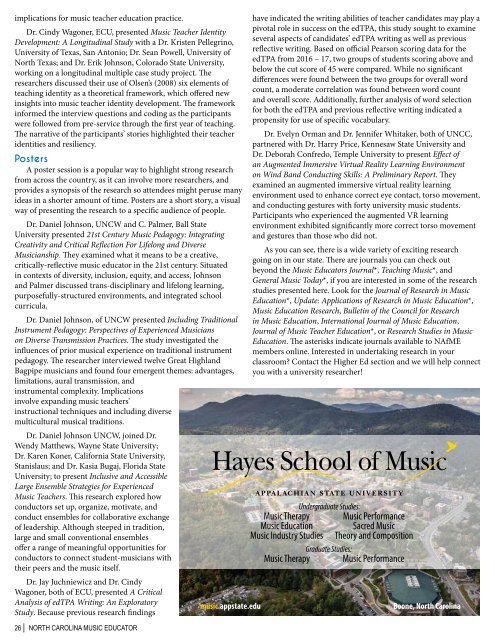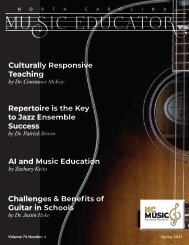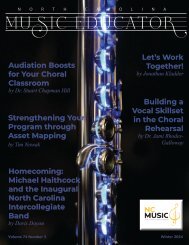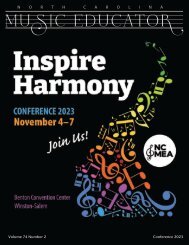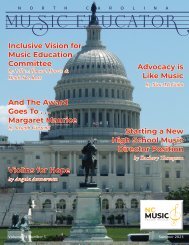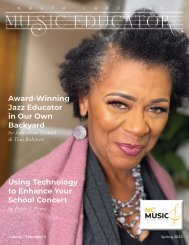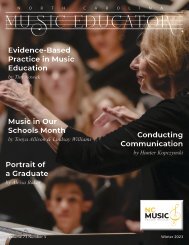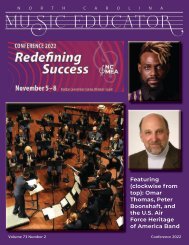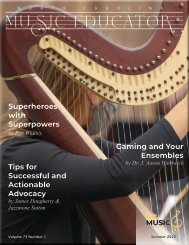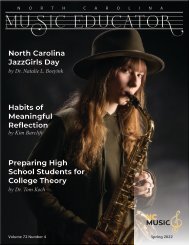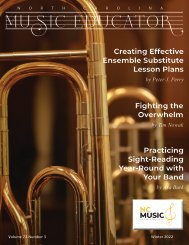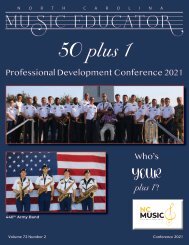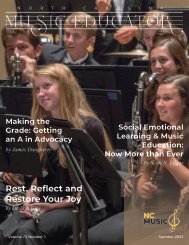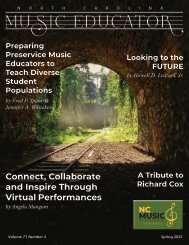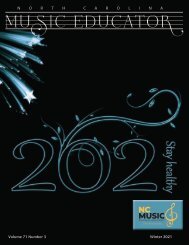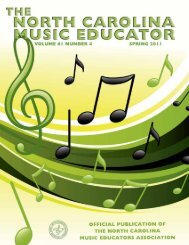NC Music Educator Spring 2018
North Carolina Music Educators Association Journal Spring 2018
North Carolina Music Educators Association Journal Spring 2018
Create successful ePaper yourself
Turn your PDF publications into a flip-book with our unique Google optimized e-Paper software.
implications for music teacher education practice.<br />
Dr. Cindy Wagoner, ECU, presented <strong>Music</strong> Teacher Identity<br />
Development: A Longitudinal Study with a Dr. Kristen Pellegrino,<br />
University of Texas, San Antonio; Dr. Sean Powell, University of<br />
North Texas; and Dr. Erik Johnson, Colorado State University,<br />
working on a longitudinal multiple case study project. The<br />
researchers discussed their use of Olsen’s (2008) six elements of<br />
teaching identity as a theoretical framework, which offered new<br />
insights into music teacher identity development. The framework<br />
informed the interview questions and coding as the participants<br />
were followed from pre-service through the first year of teaching.<br />
The narrative of the participants’ stories highlighted their teacher<br />
identities and resiliency.<br />
Posters<br />
A poster session is a popular way to highlight strong research<br />
from across the country, as it can involve more researchers, and<br />
provides a synopsis of the research so attendees might peruse many<br />
ideas in a shorter amount of time. Posters are a short story, a visual<br />
way of presenting the research to a specific audience of people.<br />
Dr. Daniel Johnson, U<strong>NC</strong>W and C. Palmer, Ball State<br />
University presented 21st Century <strong>Music</strong> Pedagogy: Integrating<br />
Creativity and Critical Reflection For Lifelong and Diverse<br />
<strong>Music</strong>ianship. They examined what it means to be a creative,<br />
critically-reflective music educator in the 21st century. Situated<br />
in contexts of diversity, inclusion, equity, and access, Johnson<br />
and Palmer discussed trans-disciplinary and lifelong learning,<br />
purposefully-structured environments, and integrated school<br />
curricula.<br />
Dr. Daniel Johnson, of U<strong>NC</strong>W presented Including Traditional<br />
Instrument Pedagogy: Perspectives of Experienced <strong>Music</strong>ians<br />
on Diverse Transmission Practices. The study investigated the<br />
influences of prior musical experience on traditional instrument<br />
pedagogy. The researcher interviewed twelve Great Highland<br />
Bagpipe musicians and found four emergent themes: advantages,<br />
limitations, aural transmission, and<br />
instrumental complexity. Implications<br />
involve expanding music teachers’<br />
instructional techniques and including diverse<br />
multicultural musical traditions.<br />
Dr. Daniel Johnson U<strong>NC</strong>W, joined Dr.<br />
Wendy Matthews, Wayne State University;<br />
Dr. Karen Koner, California State University,<br />
Stanislaus; and Dr. Kasia Bugaj, Florida State<br />
University; to present Inclusive and Accessible<br />
Large Ensemble Strategies for Experienced<br />
<strong>Music</strong> Teachers. This research explored how<br />
conductors set up, organize, motivate, and<br />
conduct ensembles for collaborative exchange<br />
of leadership. Although steeped in tradition,<br />
large and small conventional ensembles<br />
offer a range of meaningful opportunities for<br />
conductors to connect student-musicians with<br />
their peers and the music itself.<br />
Dr. Jay Juchniewicz and Dr. Cindy<br />
Wagoner, both of ECU, presented A Critical<br />
Analysis of edTPA Writing: An Exploratory<br />
Study. Because previous research findings<br />
music.appstate.edu<br />
have indicated the writing abilities of teacher candidates may play a<br />
pivotal role in success on the edTPA, this study sought to examine<br />
several aspects of candidates’ edTPA writing as well as previous<br />
reflective writing. Based on official Pearson scoring data for the<br />
edTPA from 2016 – 17, two groups of students scoring above and<br />
below the cut score of 45 were compared. While no significant<br />
differences were found between the two groups for overall word<br />
count, a moderate correlation was found between word count<br />
and overall score. Additionally, further analysis of word selection<br />
for both the edTPA and previous reflective writing indicated a<br />
propensity for use of specific vocabulary.<br />
Dr. Evelyn Orman and Dr. Jennifer Whitaker, both of U<strong>NC</strong>C,<br />
partnered with Dr. Harry Price, Kennesaw State University and<br />
Dr. Deborah Confredo, Temple University to present Effect of<br />
an Augmented Immersive Virtual Reality Learning Environment<br />
on Wind Band Conducting Skills: A Preliminary Report. They<br />
examined an augmented immersive virtual reality learning<br />
environment used to enhance correct eye contact, torso movement,<br />
and conducting gestures with forty university music students.<br />
Participants who experienced the augmented VR learning<br />
environment exhibited significantly more correct torso movement<br />
and gestures than those who did not.<br />
As you can see, there is a wide variety of exciting research<br />
going on in our state. There are journals you can check out<br />
beyond the <strong>Music</strong> <strong>Educator</strong>s Journal*, Teaching <strong>Music</strong>*, and<br />
General <strong>Music</strong> Today*, if you are interested in some of the research<br />
studies presented here. Look for the Journal of Research in <strong>Music</strong><br />
Education*, Update: Applications of Research in <strong>Music</strong> Education*,<br />
<strong>Music</strong> Education Research, Bulletin of the Council for Research<br />
in <strong>Music</strong> Education, International Journal of <strong>Music</strong> Education,<br />
Journal of <strong>Music</strong> Teacher Education*, or Research Studies in <strong>Music</strong><br />
Education. The asterisks indicate journals available to NAfME<br />
members online. Interested in undertaking research in your<br />
classroom? Contact the Higher Ed section and we will help connect<br />
you with a university researcher!<br />
APPALACHIAN STATE UNIVERSITY<br />
<strong>Music</strong> Therapy<br />
<strong>Music</strong> Education<br />
<strong>Music</strong> Industry Studies<br />
Undergraduate Studies:<br />
<strong>Music</strong> Performance<br />
Sacred <strong>Music</strong><br />
Theory and Composition<br />
Graduate Studies:<br />
<strong>Music</strong> Therapy <strong>Music</strong> Performance<br />
Boone, North Carolina<br />
Jazz<br />
It has been a busy spring in the Jazz section. We<br />
completed our first round of All-State auditions with<br />
the new format. We then had a wonderful All-State<br />
Clinic, with it being hosted for the first time at North Carolina<br />
State University on April 13 – 14. Please keep in touch with<br />
the website about changes in next year’s auditions. Also, please<br />
send in applications to perform at this year’s conference to<br />
jazz_chair@ncmea.net. We wish all of the groups participating<br />
in Jazz MPA’s the best of luck. Consider using that recording to<br />
apply to play at this year’s conference. Below are the biographies<br />
of our clinicians for our wonderful All-State Jazz Bands.<br />
Bryan Carter<br />
With a confidence reflecting an<br />
instrumental and compositional<br />
maturity that both belie his age<br />
and announce the arrival of a<br />
remarkable talent, Bryan Carter<br />
exudes what promises a highly<br />
successful career.<br />
Shortly after completing his<br />
training at The Juilliard School<br />
in New York City and still at the<br />
very outset of his career, Carter<br />
has already played and/or recorded with many notable artists<br />
including Clark Terry, McCoy Tyner, Wynton Marsalis, Branford<br />
Marsalis, Mulgrew Miller, Jon Faddis, Ted Nash, Terell Stafford,<br />
Bobby Watson, Lew Tabackin, Kenny Barron, Cyrus Chestnut<br />
and currently tours with vocalists Michael Feinstein and Kurt<br />
Elling.<br />
Carter’s profound respect for the jazz tradition and his ability<br />
to create new music that reflects a deep connection to this rich<br />
heritage is not surprising given his background. Beginning<br />
drums at the age of three, Carter quickly developed a strong<br />
passion for music — especially jazz. By the age of eleven he had<br />
already studied with legendary drummers Louie Bellson, Harold<br />
Jones, and Ed Thigpen.<br />
He attended The Juilliard School as a jazz studies major and<br />
studied with Carl Allen and Kenny Washington. He was the<br />
recipient of the Irene Diamond Scholarship as well as the Samuel<br />
L Jackson Scholarship. While at Juilliard, Carter took a strong<br />
interest in composition, orchestration and interdivisional crosscollaborative<br />
performance.<br />
As a new artist, Carter’s access to extensive outlets lead to<br />
performances at iconic and globally recognized venues including<br />
Lincoln Center, Carnegie Hall, The Staples Center and the<br />
Chicago Symphony Center. He also continues to travel and<br />
Keith Grush, Chair<br />
perform at clubs, festivals and concert halls around the world.<br />
The Bryan Carter Quintet released its first CD entitled<br />
“Enchantment” in May 2011, which peaked in the top 15 of the<br />
Jazz Week radio charts and CMJ Jazz charts.<br />
Carter has also conducted clinics, master classes and<br />
workshops at schools, colleges and universities around the<br />
world. Currently, Carter serves as a teaching artist for the Jazz<br />
at Lincoln Center, “Jazz for Young People” program in New<br />
York City and The House Drummer for NBC’s Maya and Marty.<br />
Bryan endorses Sakae Drums, Vic Firth Drumsticks, Remo<br />
Drumheads, Zildjian Cymbals and 64 Audio Monitors.<br />
Wes Parker<br />
Dr. Wes Parker has served as<br />
the director of jazz studies at North<br />
Carolina State University since<br />
2006. He directs the jazz ensembles,<br />
coaches jazz combos, teaches jazz<br />
history and jazz improvisation,<br />
and instructs students in the low<br />
brass studio. He holds a Bachelor<br />
of Science in music education from<br />
Tennessee Tech University, a Master<br />
of <strong>Music</strong> and a Doctor of <strong>Music</strong>al<br />
Arts in trombone performance and pedagogy performance from<br />
The University of Southern Mississippi.<br />
Parker’s trombone playing has been heard in jazz ensembles<br />
and orchestras throughout the United States. As an active<br />
freelance musician, Parker has performed with such artists<br />
as Branford Marsalis, Ellis Marsalis, Michael Feinstein, Josh<br />
Groban, Aretha Franklin, Idina Menzel, Regis Philbin, Placido<br />
Domingo, the Jimmy Dorsey Orchestra, the Temptations, and<br />
the Pointer Sisters.<br />
Under Parker’s direction, the jazz program at <strong>NC</strong> State has<br />
grown to offer six performing jazz ensembles, and has hosted<br />
such great jazz musicians as Wayne Bergeron, Jeff Coffin, Bobby<br />
Shew, Chris Vadala, Jiggs Whigham, and Harry Watters.<br />
An active clinician, Parker has worked with middle school,<br />
high school, and collegiate jazz ensembles, as well as numerous<br />
marching bands throughout the Southeast. Prior to his<br />
appointment at <strong>NC</strong> State, he served as the interim professor of<br />
trombone at The University of Southern Mississippi, and spent<br />
time teaching public school in Mississippi and Oklahoma.<br />
26 | NORTH CAROLINA MUSIC EDUCATOR NORTH CAROLINA MUSIC EDUCATOR | 27


